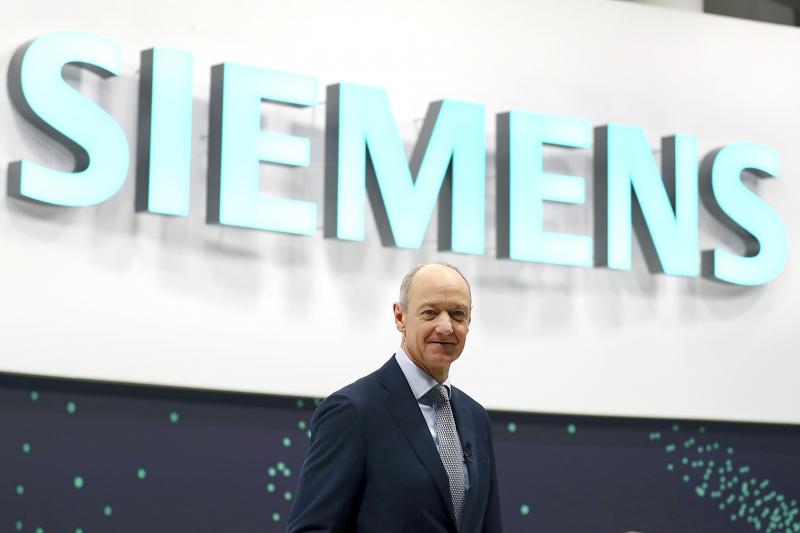Siemens AG raised its annual guidance after better-than-expected sales and profit in its first quarter to Dec. 31 last year, the latest sign Europe’s biggest engineering company is benefiting from a strong rebound in China.
Siemens now sees full-year net income rising to as much as 5.5 billion euros (US$6.6 billion) from 4.2 billion euros last year, clearly above previous expectations for moderate growth, it said yesterday.
That is after comparable revenue increased in all four of its industrial businesses, including at its high-margin software segment.

Photo: AP
“Some of the industries we lead have recovered clearly faster than expected,” co-chief executive officer Roland Busch said. “China stood out clearly here: The Chinese economy has recovered from the downturn, and its gross domestic product is now higher than it was before the [COVID-19] pandemic.”
The raised outlook is a boon to long-time boss Joe Kaeser, who was to hand over the reigns of the German conglomerate to Busch later yesterday.
During his seven-year run, Kaeser streamlined Siemens’s sprawling conglomerate structure to help it focus on high-margin businesses, such as its factory-automation software.
Demand from China, which has roared back to pre-pandemic growth rates, has given key support to global trade and to some of Germany’s biggest exporters, including automakers Volkswagen AG and BMW AG.
Still, Siemens cautioned that it continues to expect a “complex” macroeconomic environment because of the pandemic and said its outlook is based on economies continuing to recover.
“It’s very uncertain what the global development will do in terms of both supply chain as well as, of course, on the demand side,” Kaeser said in an interview on Bloomberg TV.
“That’s why it’s so important that we get the vaccine rolled out to everybody,” he said.
Group sales rose 7 percent on a comparable basis in the first quarter, with operating profit at its industrial business jumping 39 percent.
In China, Siemens won orders to help BMW increase manufacturing capacity and digitize the factories of a local glassmaker.
In Egypt, the company signed a memorandum of understanding to build the country’s first high-speed rail system.
Siemens has weathered the pandemic better than some of its automotive and industrial clients partly because it was able to keep its factories running virtually uninterrupted.
It has also had an easier ride than US rival General Electric Co, which is reliant on aviation customers hit by a collapse in air travel.

Taiwan Semiconductor Manufacturing Co (TSMC, 台積電) secured a record 70.2 percent share of the global foundry business in the second quarter, up from 67.6 percent the previous quarter, and continued widening its lead over second-placed Samsung Electronics Co, TrendForce Corp (集邦科技) said on Monday. TSMC posted US$30.24 billion in sales in the April-to-June period, up 18.5 percent from the previous quarter, driven by major smartphone customers entering their ramp-up cycle and robust demand for artificial intelligence chips, laptops and PCs, which boosted wafer shipments and average selling prices, TrendForce said in a report. Samsung’s sales also grew in the second quarter, up

On Tuesday, US President Donald Trump weighed in on a pressing national issue: The rebranding of a restaurant chain. Last week, Cracker Barrel, a Tennessee company whose nationwide locations lean heavily on a cozy, old-timey aesthetic — “rocking chairs on the porch, a warm fire in the hearth, peg games on the table” — announced it was updating its logo. Uncle Herschel, the man who once appeared next to the letters with a barrel, was gone. It sparked ire on the right, with Donald Trump Jr leading a charge against the rebranding: “WTF is wrong with Cracker Barrel?!” Later, Trump Sr weighed

HEADWINDS: Upfront investment is unavoidable in the merger, but cost savings would materialize over time, TS Financial Holding Co president Welch Lin said TS Financial Holding Co (台新新光金控) said it would take about two years before the benefits of its merger with Shin Kong Financial Holding Co (新光金控) become evident, as the group prioritizes the consolidation of its major subsidiaries. “The group’s priority is to complete the consolidation of different subsidiaries,” Welch Lin (林維俊), president of the nation’s fourth-largest financial conglomerate by assets, told reporters during its first earnings briefing since the merger took effect on July 24. The asset management units are scheduled to merge in November, followed by life insurance in January next year and securities operations in April, Lin said. Banking integration,

LOOPHOLES: The move is to end a break that was aiding foreign producers without any similar benefit for US manufacturers, the US Department of Commerce said US President Donald Trump’s administration would make it harder for Samsung Electronics Co and SK Hynix Inc to ship critical equipment to their chipmaking operations in China, dealing a potential blow to the companies’ production in the world’s largest semiconductor market. The US Department of Commerce in a notice published on Friday said that it was revoking waivers for Samsung and SK Hynix to use US technologies in their Chinese operations. The companies had been operating in China under regulations that allow them to import chipmaking equipment without applying for a new license each time. The move would revise what is known